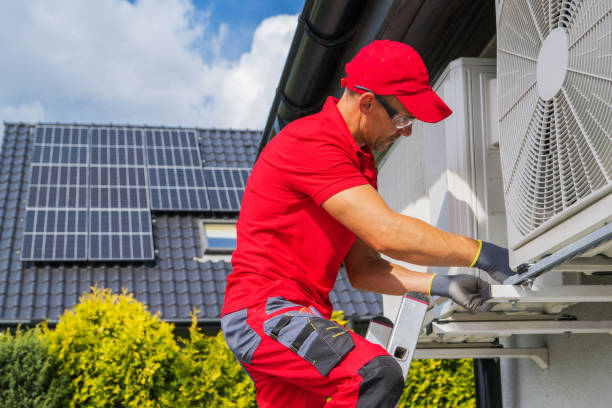Optimizing Energy Efficiency: The Role of Heating and Air-Conditioning Services
Few components are as important in the complex dance of keeping a comfortable living area as the heating, ventilation, and air conditioning (HVAC) system. Energy efficiency in HVAC operations has become more important as technology develops and environmental concerns gain prominence. We explore the critical role that heating and air conditioning services play in improving energy efficiency in this thorough analysis, not just as a way to save expenses but also as a responsible step towards a sustainable future.
Understanding the Energy Landscape: Challenges and Opportunities
A significant amount of the total energy used is accounted for by energy consumption in residential and commercial structures. Within this realm, HVAC systems emerge as major contributors to energy bills. Heating and cooling demands vary with the seasons, and inefficient HVAC operations can lead to significant energy waste.
Therefore, finding a balance between preserving comfort and reducing energy use is the challenge. This is where knowledge of heating and cooling services becomes useful, providing solutions that maximize energy efficiency while fitting in with contemporary environmental objectives.
The Impact of Routine Maintenance: A Proactive Approach
At the forefront of energy efficiency in HVAC systems lies the practice of routine maintenance. The idea is simple yet profound: a well-maintained system operates more efficiently, utilizing less energy to achieve the desired temperature levels.
During routine maintenance, certified technicians inspect and clean various components of the HVAC system. This includes cleaning or replacing air filters, checking refrigerant levels, and calibrating thermostats. By addressing issues proactively, maintenance not only prevents breakdowns but also ensures that the system operates at its peak performance, minimizing energy waste.
The Crucial Role of Proper Installation: Setting the Foundation for Efficiency
While routine maintenance can enhance the ongoing efficiency of an HVAC system, the foundation for energy optimization is laid during the installation phase. Professional heating and air-conditioning services employ a meticulous approach to system installation, considering factors such as building size, insulation, and climate to determine the most energy-efficient solution.
Choosing the right-sized system is crucial. An oversized system may cycle on and off frequently, leading to energy inefficiency and increased wear and tear. Conversely, an undersized system may struggle to meet the heating or cooling demands, resulting in continuous operation and higher energy consumption.
Technological improvements also enhance the energy efficiency of HVAC systems. Heat pumps, air conditioners, and furnaces with high efficiency require less energy to provide the same degree of comfort, which has advantages for the environment and the economy. Expert services keep up with these developments and point customers in the direction of solutions that support their objectives for energy efficiency.
Energy-Efficient Practices: A Holistic Approach
Beyond maintenance and installation, heating and air-conditioning services advocate for energy-efficient practices that homeowners can adopt. Simple actions, such as setting the thermostat to optimal temperatures, using programmable thermostats, and ensuring proper insulation, can significantly impact energy consumption.
Moreover, the integration of smart technology has opened new avenues for energy optimization. Smart thermostats allow for remote temperature control, enabling homeowners to adjust settings based on occupancy patterns and outside weather conditions. This level of control not only enhances comfort but also contributes to energy savings.
Regular upgrades to older systems also play a role in energy efficiency. While investing in a new HVAC system may seem daunting, the long-term energy savings and reduced environmental impact make it a sound decision. Professional services guide consumers through the selection process, ensuring that the chosen system aligns with both comfort needs and sustainability goals.
The Economic and Environmental Benefits: A Win-Win Proposition
Enhancing HVAC energy efficiency is a step toward lessening our environmental impact in addition to financial savings. Because energy-efficient systems use less electricity, their carbon footprint is smaller overall, and their greenhouse gas emissions are reduced. Consumers who invest in energy-efficient heating and air conditioning services are helping to achieve the overarching objective of creating a future that is both environmentally sensitive and sustainable.
Economically speaking, the advantages are clear. Long-term cost savings from lower energy bills more than outweigh the original expense of installing energy-efficient systems and services. For homes wishing to update to more energy-efficient models, numerous utility companies also provide incentives and rebates, which further sweetens the pot for those considering the switch.
Selecting the Right Service Provider: A Critical Decision
Selecting the appropriate service provider is the first step toward achieving maximum energy efficiency in heating and air conditioning systems. With so many options available, customers should seek out suppliers who have a reputation for offering environmentally friendly products and services as well as a history of producing energy-efficient solutions.
Certifications from industry-specific organizations and the Environmental Protection Agency’s (EPA) can be used to gauge a service provider’s commitment to energy efficiency. Consumers can also make educated selections regarding the experience and dependability of a service provider by asking for suggestions, reading reviews, and assessing the breadth of services provided.
Conclusion
The importance of heating and air conditioning services in maximizing energy efficiency is growing as the globe struggles with the effects of climate change and increased energy consumption. These services, which range from routine maintenance to system installations and the encouragement of energy-efficient behaviors, are essential for coordinating HVAC operations with contemporary sustainability objectives.
At the front of this trend are homeowners, who make choices that improve their comfort levels while also advancing sustainability and energy efficiency. Through the selection of energy-efficient professional heating and air conditioning services, customers may start along a path that lowers energy costs, lessens their impact on the environment, and increases their sense of duty towards the world. Through the symbiotic interaction between technology, knowledge, and responsible decision-making, we open the door to a future in which environmental stewardship and comfort can coexist together.
